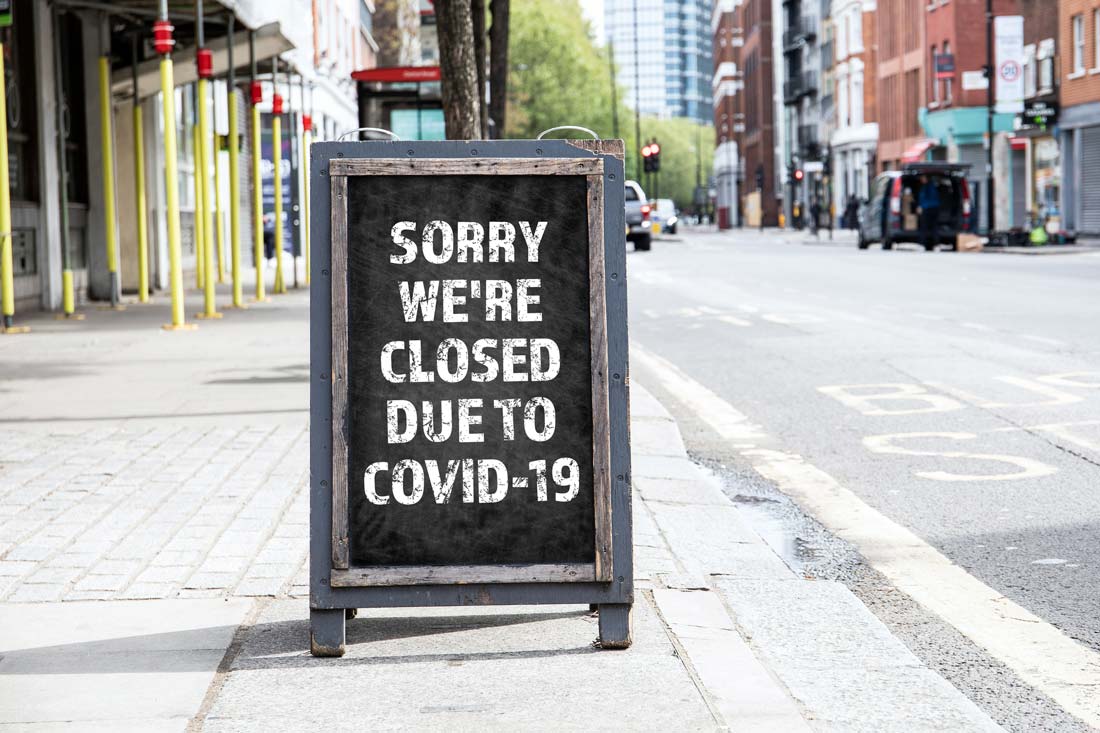The COVID 19 pandemic has radically altered the insurance claims and underwriting environment and has resulted in more than 1,500 insurance coverage litigations. In the second of three essays on lessons for risk management professionals, Peter A. Halprin, our guest columnist and a Partner at Pasich LLP, discusses the differing approaches taken by governments in relation to business interruption losses and coverage disputes.

The same, of course, cannot be said for the United States (Andy Slavitt’s forthcoming book, “Preventable: The Inside Story of How Leadership Failures, Politics, and Selfishness Doomed the U.S. Coronavirus Response” seems likely to address these issues in detail). But this lack of a national public health response also extends to the inability of the federal and state governments to assist businesses and insurers in finding common ground and avoiding disputes. Part I of this series noted there were more than 1,400 pandemic insurance lawsuits in the United States. By the time this article went to print, insureds facing one-year suit limitation deadlines were forced to bring suit, and the number went even higher.
What this article, however, highlights is that this wasn’t necessarily inevitable. Rather, through the use of governmental leadership – either in regulatory actions or in facilitating public-private partnerships – such as those efforts undertaken in other countries, the landscape might look very different.
This article highlights a few examples from overseas – the business interruption test case brought by the United Kingdom’s Financial Conduct Authority, and public-private partnerships regarding business interruption coverage in Germany and Switzerland – and contrasts these with domestic approaches. As to the latter, the article focuses on the approaches of the federal government in relation to the Pandemic Risk Insurance Act and some other alternatives, and states legislatures and regulators in relation to business interruption legislation and regulation.
The FCA Test Case
In the United Kingdom, the government initiated a comprehensive lawsuit to bring clarity and certainty to pandemic-related business interruption insurance claims. Specifically, the Financial Conduct Authority (“FCA”), the UK’s financial services regulator, brought a test case against eight insurers to obtain judicial interpretations of the rights of insureds under 21 representative business interruption policy wordings.
Following lengthy submissions by the parties and an eight-day trial, the High Court of Justice, Business and Property Courts, Queen’s Bench Division, rendered its decision on September 15, 2020—a big win for insureds. The decision was appealed, fast-tracked to the English Supreme Court, and – on January 15, 2021 – largely upheld.
In Financial Conduct Authority v. Arch Insurance (UK) Ltd., the initial decision, the High Court pointed out the potential impact of its decision:
[T]he FCA estimated that, in addition to the particular policies chosen for the test case, some 700 types of policies across over 60 different insurers and 370,000 policyholders could potentially be affected by the test case (Id. ¶ 7.)
According to the English Supreme Court’s press summary of its decision:
These appeals clarify whether a variety of insurance policy wordings cover business interruption losses resulting from the COVID-19 pandemic and public health measures taken by UK authorities in response to the pandemic from March 2020.
This isn’t to say that there won’t be litigation in the UK regarding insurance coverage issues, not all issues were addressed in the “Test Case.” That said, a significant amount of clarity has been brought to a significant number of policies involving a significant number of policyholders, all in less than one year.
Public-Private Partnerships in Germany and Switzerland
Throughout Europe, there are reports of public-private partnerships whereby the State agreed to pay portions of business income losses while the insurers paid additional portions, or the insurers otherwise agreed to make voluntary payments to support their insureds (OECD Policy Responses to Coronavirus (COVID-19), “Responding to the COVID-19 and pandemic protection gap in insurance,” Box 2 (Updated September 9, 2020)).
In the German state of Bavaria, for example, the Bavarian Ministry of Economic Affairs, industry associations, and some insurers came up with the non-binding recommendation that insurers will cover a set portion (10-15%) of hospitality business income losses (Bird & Bird, “Germany,”). According to the reporting, some insurers have voluntarily declared that they would provide a higher percentage payment (Id.). It has also been reported that the German state is paying 70% of the same losses.
On the voluntary payment front, Swiss insurer Helvetia offered to pay 50% of the business interruption losses of its Swiss restaurant policyholders even though it maintains that the risk is legally excluded from its policies (Id.)
Per one commentary:
No doubt risk managers, insurers, lawyers and politicians in North America and the UK will gasp with horror at the compromise agreements reached in Switzerland and Bavaria. But the fact is that most continental European risk managers will likely applaud the moves, which seek to help rebuild local economies while at the same time hopefully averting hugely expensive, time-consuming and economically damaging litigation over the validity or otherwise of BI policies for losses incurred by small businesses due to the global lockdown caused by the virus (Id.).
The Pandemic Risk Insurance Act and Alternatives
At the federal level in the United States, the two main legislative proposals are the Pandemic Risk Insurance Act of 2020 (PRIA) and the Business Continuity Protection Program (BCPP). PRIA is similar in design to the Terrorist Risk Insurance Act (TRIA), which came about after 9/11 (“Rep. Maloney Joins with Industry and Trade Association Leaders to Introduce the Pandemic Risk Insurance Act,” (May 26, 2020)). It is intended to establish a public-private partnership to create a market for private business interruption insurance. Under PRIA, the federal government, the insurance industry, and policyholders share in the risk of future pandemics. By contrast, the insurance industry supports BCPP, a program to create federally funded insurance for future pandemics (“Insurers, Agents Propose Pandemic Business Relief Plan; Plaintiffs Offer BIG Compromise,” Insurance Journal (May 22, 2020)). Supported by the insurance industry, BCPP shifts the risk of future pandemics to the federal government and away from the private insurance market. Of course, neither gained traction in 2020. And neither appears to deal with the current pandemic.
State Efforts to Address Business Interruption Insurance Disputes
Many introduced legislation to address business interruption insurance coverage. In New York, for example, a bill was introduced in March 2020 (A. 10226-B). The bill provided that:
- Any policy providing coverage for loss or damage to property (including business interruption), shall be construed to cover business interruption during a period of a declared state emergency due to the coronavirus disease 2019 (COVID-19) pandemic; (Id. at § 2(a).)
- Any clause which allows an insurer to deny coverage based on a virus, bacterium, or other microorganism that causes disease, illness, or physically distress or that is capable of causing disease, illness or physical distress shall be null and void; (Id. at § 2(e).)
- Subject to policy limits, the coverage shall extend through the duration of a period of a declared state emergency due to the coronavirus disease 2019 (COVID-19) pandemic; (Id. at § 2(f).) and
- The legislation applies to policies issued to insureds with less than 250 eligible employees (i.e., full-time employees who work a normal work week of 25 or more hours). (Id. at § 2(g).)
Like similar bills around the country, however, it has not gone anywhere. And, even if it were to pass, insureds seeking relief may not find any. When such bills were first announced, there were rumblings that insurers would challenge the constitutionality of such bills under the Constitution’s Contracts Clause (Tyler Clifford, “Chubb CEO: Forcing insurers to pay pandemic loss claims is ‘plainly unconstitutional,’” CNBC (Apr. 16, 2020)). Thus, even if such a law were to pass and would survive legal challenge, litigation could delay needed payment for years.
Not to pick on New York but its regulatory efforts didn’t go anywhere either. New York’s Financial Conduct Authority equivalent, the Department of Financial Services (DFS), requested information from insurers, issued guidance, and developed regulations. Two examples follow:
On March 10, 2020, DFS issued a “Call for Special Report Pursuant to Section 308, New York Insurance Law: Business Interruption and Related Coverage Written in New York.” Pursuant to this, insurers were directed to provide information to DFS regarding commercial property insurance and business interruption coverage, and to explain to their policyholders the coverage available in relation to COVID-19. This largely generated form notices.
On March 30, 2020, DFS issued a consolidated emergency regulation which, among other things, permitted policyholders to make late payments of premium if the delay in doing so was due to COVID-19-related financial hardship (DFS, Call for Special Report Pursuant to Section 308, New York Insurance Law: Business Interruption and Related Coverage Written in New York (March 10, 2020)). For those insureds concerned about premium payments, some relief may be available.
Takeaways
While I wish this article took a more optimistic turn, the intention here was to focus on what lessons risk management professionals can take away from the pandemic insurance wars. The answer is that, at least here in the United States at present, a risk management plan that is premised upon government intervention is not a good plan. The examples above demonstrate that there is little hope for businesses to obtain business income relief from government arising out of the current pandemic and, thus far, no federal arrangement for the next one. Likewise, using New York as an example, and it is just one of many states that introduced such legislation, well-intentioned legislatures were unable to pass such bills.
Just as I cautioned that a dose of realism needs to be injected into expectations regarding relationships with insurers, the same needs to said for reliance on government action and intervention.


 RSS Feed
RSS Feed